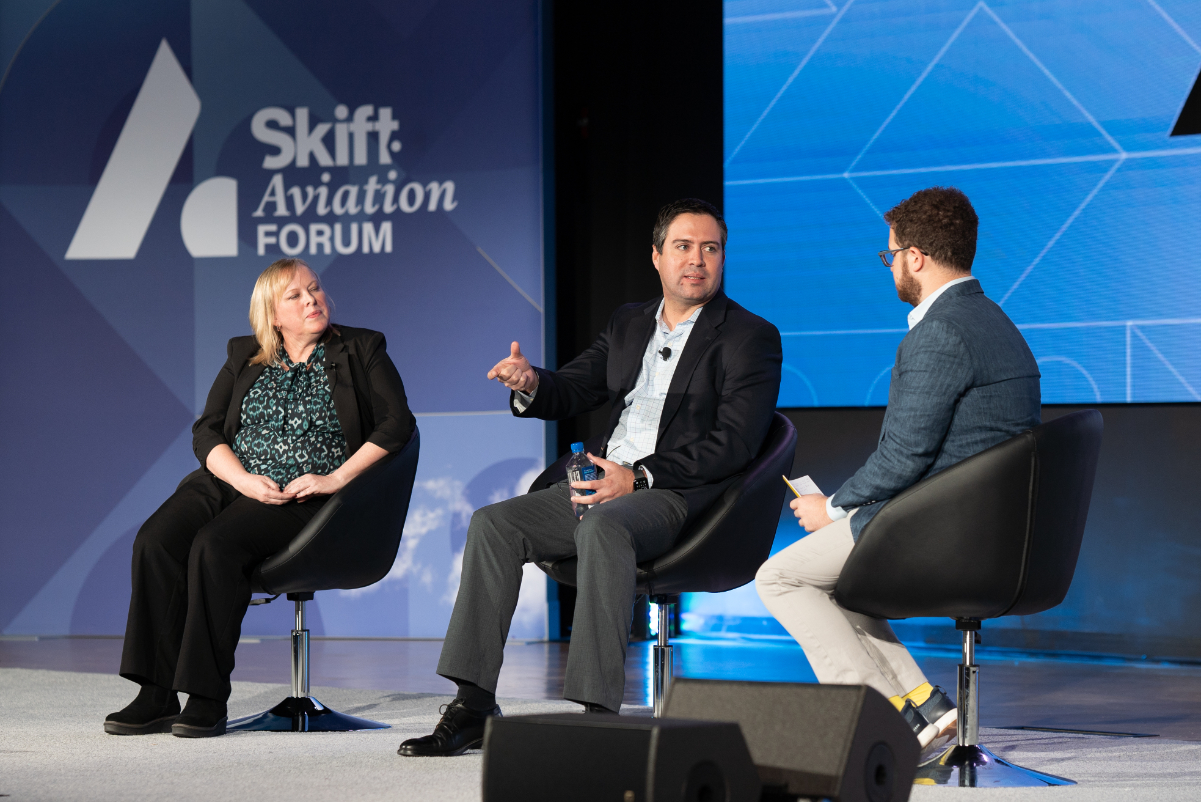Skift Take
In the perpetual tug of war between airlines and online middlemen, a bit of turnabout is fair play.
Airlines used to lean on online travel agencies to find customers. But now in something of a turnabout, airlines have enough loyalists that online travel companies are, in some cases, providing services to airlines to help them sell upsells and packages directly.
Executives from Expedia Group and JetBlue discussed the changed dynamic on Wednesday at Skift Aviation Forum 2022 in Dallas-Fort Worth in a conversation with Seth Borko, senior research analyst at Skift Research.
Expedia Group has been attempting to take the sales and distribution knowledge it’s built up in its consumer business and apply that to business-to-business services, as Skift has reported. The online travel giant helps airlines learn how to better put together and sell upsells and packages to the airline’s customers.
“If an airline thinks, ‘Hey let’s put this in there, and if you build it, they will come,’ it probably won’t work,” said Julie Kyse, vice president, global air partnerships — who leads the team responsible for Expedia Group’s relationships with airlines.
“You need to make sure you’ve got the right placements with the right discoverability on the website,” Kyse said. “We have a lot of expertise along these lines.”
JetBlue does get some non-air supply from Expedia to help create packages to sell to its customers. But in the past few years, it has built JetBlue Travel Products — a collection of ventures to try to create its own institutional knowledge on selling direct.
The business unit relaunched JetBlue Vacations, launched Paisly — which “offers travelers trip add-ons such as rental cars, hotels, and theme park tickets, tied to their JetBlue reservations“) — and this year debuted Troupe, a group trip booking planner app.
JetBlue Travel Products is small but growing. It’s on track to generate about $100 million in earnings before interest and taxes this year. That pales compared to the billions in revenue the parent airline company forecasts to make this year, but it’s a significant profit in an often thin-margin sector.
Expedia, set to generate billions in revenue this year, doesn’t feel threatened by the direct selling efforts of airlines such as JetBlue. The company instead sees direct airline sales of non-air products as one segment as part of a bigger pie, with the overall pie getting larger.
“There are customers that have a natural affinity for JetBlue, and we appreciate that JetBlue has a relationship with them, and we want to help them grow that relationship,” Kyse said. “It’s up to us to build in a certain amount of stickiness on our own sites by investing in loyalty programs and things that drive people to continue to come to Expedia’s brands.”
Expedia can also provide broader insights for its partners about shifts in market demand. For example, the company’s survey data has revealed “greater price sensitivity” among consumers, Kyse said.
JetBlue Pushes Direct
JetBlue is using several methods to help sell more non-air products directly to customers. If a person buys a vacation package from JetBlue and they have the airline’s co-branded credit card, they will get the annual fee back as a statement credit.
Any purchase of travel through JetBlue counts toward status in the carrier’s loyalty program, too, which is relatively rare as a perk in the sector.
“Yes, Expedia is one of the sources for some of the lodging we offer, but, again, we’re the ones who service the customer, and we’ve seen a lot of success so far,” said Andres Barry, president, JetBlue Travel Products.”
Have a confidential tip for Skift? Get in touch
Tags: airline distribution, coronavirus recovery, distribution, expedia, expedia group, jetblue, jetblue airways, jetblue travel products, online travel, online travel agencies, saf2022, skift live
Photo credit: At Skift Aviation Forum 2022 in Dallas-Fort Worth, Julie Kyse, vice president, global air partnerships, Expedia Group, and Andres Barry, president, JetBlue Travel Products, a collection of ventures, spoke about distribution. Source: Skift. Dylan Pacholek / Skift
